And Yet More of the Best Music You
May Have Missed
by Vance Hiner |
July 30, 2018
o far, 2018 has been a good year for
engaging, well-recorded music. Well-known performers like Father John Misty, Courtney
Barnett, Kasey Musgraves, and David Byrne are getting spots on "best of" lists
for music that rewards repeated listening on even the very best audio systems. Regular
readers will know that the raison d'être of this series
of blogs is to spotlight artists who deserve wider recognition for work that’s both
musically satisfying and sonically engaging. For instance, the 2016 edition featured indie
rocker Lucy Dacus for her under-the-radar debut record and now her phenomenally
recorded 2018 album, Historian [Matador OLE 11392], is on a number of critic's
lists. Here’s hoping this year’s crop of musicians are rewarded in equal measure
for their dedication to producing great music that sounds considerably better than the
industry’s standard fare. I've focused on CDs here, but all, except for Fatoumata
Diawara’s album, are available on vinyl too.
Paul Thorn • Don’t Let the Devil
Ride
Perpetual Obscurity POR 2018
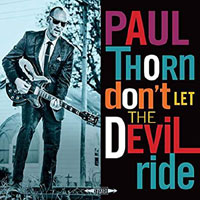 It’ll only take a few cuts of Paul
Thorn’s Don't Let the Devil Ride for you to know you’re listening to a
serious student of the Delta. Born in Tupelo, Mississippi, to a Pentecostal preacher,
Thorn comes by his roots honestly. His rough edges and lived-in voice may also have
something to do with his circuitous professional path. Thorn worked as a professional
prizefighter throughout the 1980s (ultimately facing off with Roberto Duran) before
hanging up his gloves and taking day-labor jobs and to the juke-joint stages of his
hometown. That might have been the end of Thorn’s notoriety had A&M label chief
Miles Copeland not discovered him playing in a local pizza parlor in the mid-1990s. Since
then, Thorn has honed his craft with the stubborn precision of a pugilist, each
album’s sonics getting richer, deeper and more seasoned, each one moving just a step
closer to the cradle of the blues. With Don't Let the Devil Ride, Thorn has
gathered together a collection of gospel-flavored blues and R&B classics that he
delivers with the perspiring passion of a tambourine-shaking minister. Thorn’s voice
is a combination of grit and growl that fits him like a comfortable pair of alligator
shoes. His searing rendition of Josh White’s "Jesus Gonna Make Up My Dyin’
Bed" is guaranteed to raise goose bumps. The icing on this sonic tent revival are
heartfelt contributions by The Blind Boys of Alabama, the legendary McCrary Sisters and
the Preservation Hall Jazz Band. Don't Let the Devil Ride is a roots record that
moves both body and soul. It’ll only take a few cuts of Paul
Thorn’s Don't Let the Devil Ride for you to know you’re listening to a
serious student of the Delta. Born in Tupelo, Mississippi, to a Pentecostal preacher,
Thorn comes by his roots honestly. His rough edges and lived-in voice may also have
something to do with his circuitous professional path. Thorn worked as a professional
prizefighter throughout the 1980s (ultimately facing off with Roberto Duran) before
hanging up his gloves and taking day-labor jobs and to the juke-joint stages of his
hometown. That might have been the end of Thorn’s notoriety had A&M label chief
Miles Copeland not discovered him playing in a local pizza parlor in the mid-1990s. Since
then, Thorn has honed his craft with the stubborn precision of a pugilist, each
album’s sonics getting richer, deeper and more seasoned, each one moving just a step
closer to the cradle of the blues. With Don't Let the Devil Ride, Thorn has
gathered together a collection of gospel-flavored blues and R&B classics that he
delivers with the perspiring passion of a tambourine-shaking minister. Thorn’s voice
is a combination of grit and growl that fits him like a comfortable pair of alligator
shoes. His searing rendition of Josh White’s "Jesus Gonna Make Up My Dyin’
Bed" is guaranteed to raise goose bumps. The icing on this sonic tent revival are
heartfelt contributions by The Blind Boys of Alabama, the legendary McCrary Sisters and
the Preservation Hall Jazz Band. Don't Let the Devil Ride is a roots record that
moves both body and soul.
Darlingside • Extralife
More Doug Records 51222
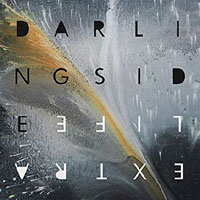 With their third studio album, Extralife, Massachusetts-based
Darlingside continues to hone their self-described "string rock" sound to ever
more ethereal heights. While the band’s four-part-harmony-filled confections are
reminiscent of Brian Wilson’s meticulous Pet Sounds arrangements, the group
manages to throw in folkier flavors that give this set a refreshingly unique texture. On
tracks like "Singularity" Auyon Mukharji’s intricate violin and mandolin
fills weave in and out of the band’s soaring vocals, while bassist and kick drummer
Brian Senf’s driving rhythms provide just the weight needed to keep the light and
airy melody from evaporating too quickly. The pacing kicks into high gear on the galloping
"Futures," revealing an ensemble that has the instrumental chops necessary to
sustain a substantial composition. The band’s name was inspired by a famous
instruction given by British author Sir Arthur Quiller-Couch that his students should be
prepared to "kill their darlings," those precious phrases every writer fights to
defend. The rich, yet uncluttered production on Extralife would indicate that the
members are faithfully following their muse. It’s hard to find a note or phrase
that’s out of place in any of the luscious musical dishes on this organic and
balanced recording. With their third studio album, Extralife, Massachusetts-based
Darlingside continues to hone their self-described "string rock" sound to ever
more ethereal heights. While the band’s four-part-harmony-filled confections are
reminiscent of Brian Wilson’s meticulous Pet Sounds arrangements, the group
manages to throw in folkier flavors that give this set a refreshingly unique texture. On
tracks like "Singularity" Auyon Mukharji’s intricate violin and mandolin
fills weave in and out of the band’s soaring vocals, while bassist and kick drummer
Brian Senf’s driving rhythms provide just the weight needed to keep the light and
airy melody from evaporating too quickly. The pacing kicks into high gear on the galloping
"Futures," revealing an ensemble that has the instrumental chops necessary to
sustain a substantial composition. The band’s name was inspired by a famous
instruction given by British author Sir Arthur Quiller-Couch that his students should be
prepared to "kill their darlings," those precious phrases every writer fights to
defend. The rich, yet uncluttered production on Extralife would indicate that the
members are faithfully following their muse. It’s hard to find a note or phrase
that’s out of place in any of the luscious musical dishes on this organic and
balanced recording.
The Milk Carton Kids • All the Things I
Did and All the Things I Didn’t Do
Anti- 87516
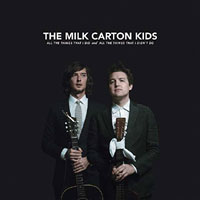 Singer/songwriters Kenneth Pattengale and Joey Ryan’s work
under the stage moniker The Milk Carton Kids is well known to hardcore folk fans, but
they’re less known beyond the boundaries of that particular niche. That may be partly
explained by their insistence on producing albums featuring nothing more than guitars and
voices. While dedication to that vision of simplicity produced stunning songs like
"Michigan" on their 2011 debut, I’ve always felt their albums were a bit
one-dimensional. That’s why it’s such a pleasure to hear the duo’s latest
effort, produced by the legendary Joe Henry, whose award-winning studio skills have
benefited a number of artists like Allen Toussaint and Elvis Costello. Henry has guided
Milk Carton Kids to explore wider sonic pastures without leading them away from their
trademark introspection and brutally honest commentary. In addition to his regular
wrecking crew of drummer Jay Bellerose, bassist Dennis Crouch and Levon Henry on saxophone
and B-flat clarinet, Henry directs a host of guest musicians like Wilco keyboardist Pat
Sansone. Pattengale and Ryan’s tight harmonies, which evoke a combination of Simon
& Garfunkel moodiness and Everly Brothers sweetness, are boosted by the surrounding
ensemble on standout cuts like "Younger Years." The song sounds like a sequel to
"The Boxer" without falling through the trapdoor of pastiche. The sonics on this
album can be summarized with one word: transparent. Singer/songwriters Kenneth Pattengale and Joey Ryan’s work
under the stage moniker The Milk Carton Kids is well known to hardcore folk fans, but
they’re less known beyond the boundaries of that particular niche. That may be partly
explained by their insistence on producing albums featuring nothing more than guitars and
voices. While dedication to that vision of simplicity produced stunning songs like
"Michigan" on their 2011 debut, I’ve always felt their albums were a bit
one-dimensional. That’s why it’s such a pleasure to hear the duo’s latest
effort, produced by the legendary Joe Henry, whose award-winning studio skills have
benefited a number of artists like Allen Toussaint and Elvis Costello. Henry has guided
Milk Carton Kids to explore wider sonic pastures without leading them away from their
trademark introspection and brutally honest commentary. In addition to his regular
wrecking crew of drummer Jay Bellerose, bassist Dennis Crouch and Levon Henry on saxophone
and B-flat clarinet, Henry directs a host of guest musicians like Wilco keyboardist Pat
Sansone. Pattengale and Ryan’s tight harmonies, which evoke a combination of Simon
& Garfunkel moodiness and Everly Brothers sweetness, are boosted by the surrounding
ensemble on standout cuts like "Younger Years." The song sounds like a sequel to
"The Boxer" without falling through the trapdoor of pastiche. The sonics on this
album can be summarized with one word: transparent.
Fatoumata Diawara • Fenfo
Wagram Records 3355752
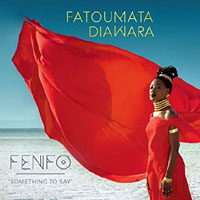 Readers of this blog series will
know that I’m an avid follower of the Mali music scene in West Africa. Bamako, the
nation’s capitol, is one of the most intriguing centers of polyglot musical culture
in the world; its artists have attracted the likes of Robert Plant, Ry Cooder, Eric Bibb
and Damon Albarn. I’ve written about the Saharan Desert rock of Tuareg, bands like
Tinarawen and Imarhan, but that’s just scratching the surface of the musical
treasures Mali has to offer. Readers of this blog series will
know that I’m an avid follower of the Mali music scene in West Africa. Bamako, the
nation’s capitol, is one of the most intriguing centers of polyglot musical culture
in the world; its artists have attracted the likes of Robert Plant, Ry Cooder, Eric Bibb
and Damon Albarn. I’ve written about the Saharan Desert rock of Tuareg, bands like
Tinarawen and Imarhan, but that’s just scratching the surface of the musical
treasures Mali has to offer.
Singer Fatoumata Diawara hails from Mali’s Ivory
Coast and sings in Wassoulou, the native language of that region. While still retaining
the polyrhythmic pulse and guitar acrobatics of most Malian music, Diawara delivers the
passionate call-and-response pattern of Wassoulou as well as the club sounds of Paris.
Diawara’s lyrics focus on the struggles of women around the world, very much
following in the footsteps of her mentor, Wassoulou star Oumou Sangaré. The combination
of melody and passion is sweet and intense. Diawara’s voice matches her visual
presentation; even while swooping over huge swaths of the musical scale and whipping notes
until they seem to quiver and shake, she manages to sound regal, elegant and highly
disciplined.
If Diawara’s voice wasn’t enough to recommend
this disc, the sound production is gripping and multi-layered. Played on the right system,
bass notes and drum beats will rattle your walls and delicate acoustic string fills will
float in space. This album is proof that Mali’s Wassoulou music deserves to be heard
by a much wider audience than just musicologists and curious musicians.
Joshua Redman • Still Dreaming
Nonesuch 7559793308
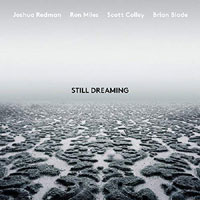 It has been 25 years since saxophonist Joshua Redman took the jazz world by
storm, garnering impossible-to-live-up-to critical hype that labeled him the new John
Coltrane. Redman, the son of saxophonist Dewey Redman, responded by keeping his head down
and shoulder to the wheel, working on dozens of records and involving himself in scores of
noteworthy side projects. Still Dreaming, Redman’s 17th album as a leader, is
proof that hard work pays off. This record is an homage to his father’s collaboration
with Ornette Coleman on the 1976 Old and New Dreams, which also featured bassist
Charlie Haden, trumpeter Don Cherry and drummer Ed Blackwell. While not the innovator
Coleman was, Redman uses his finely honed technical skills and hard-earned musical
insights on Still Dreaming to recapture that wonderful pot of free jazz, hard bop
and avant-garde instincts that Coleman stirred up back in the day. And now Redman returns
the favor by pushing the envelope a bit with the help of trumpeter Ron Miles, bassist
Scott Colley and drummer Brian Blade. Some tracks like "It’s Not the Same"
call to mind Henry Threadgill’s slightly off-kilter melodies and rhythms that teeter
close to the edge but then return to the warm comfort of familiar ground. "Blues for
Charlie" was written in honor of the late Charlie Haden, but it also manages to pay
tribute to some of the pulpit-pounding blues compositions of Charles Mingus. "Haze
and Aspirations" takes a more brooding, introspective approach and could be part of a
movie scene of a man wandering a city in search of answers. The sound of this release is
very live, and proper mic placement yields a realistic sense of studio space and
player location. It’s a what-they-played-is-what-you-get approach. With Still
Dreaming, Redman has produced an album that matches and in some ways surpasses his
father’s work with Coleman. It has been 25 years since saxophonist Joshua Redman took the jazz world by
storm, garnering impossible-to-live-up-to critical hype that labeled him the new John
Coltrane. Redman, the son of saxophonist Dewey Redman, responded by keeping his head down
and shoulder to the wheel, working on dozens of records and involving himself in scores of
noteworthy side projects. Still Dreaming, Redman’s 17th album as a leader, is
proof that hard work pays off. This record is an homage to his father’s collaboration
with Ornette Coleman on the 1976 Old and New Dreams, which also featured bassist
Charlie Haden, trumpeter Don Cherry and drummer Ed Blackwell. While not the innovator
Coleman was, Redman uses his finely honed technical skills and hard-earned musical
insights on Still Dreaming to recapture that wonderful pot of free jazz, hard bop
and avant-garde instincts that Coleman stirred up back in the day. And now Redman returns
the favor by pushing the envelope a bit with the help of trumpeter Ron Miles, bassist
Scott Colley and drummer Brian Blade. Some tracks like "It’s Not the Same"
call to mind Henry Threadgill’s slightly off-kilter melodies and rhythms that teeter
close to the edge but then return to the warm comfort of familiar ground. "Blues for
Charlie" was written in honor of the late Charlie Haden, but it also manages to pay
tribute to some of the pulpit-pounding blues compositions of Charles Mingus. "Haze
and Aspirations" takes a more brooding, introspective approach and could be part of a
movie scene of a man wandering a city in search of answers. The sound of this release is
very live, and proper mic placement yields a realistic sense of studio space and
player location. It’s a what-they-played-is-what-you-get approach. With Still
Dreaming, Redman has produced an album that matches and in some ways surpasses his
father’s work with Coleman.
Lera Lynn • Plays Well With Others
Single Rock Records SL 026CD
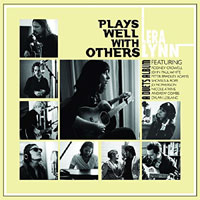 From the spooky, resonant cello lines and luscious string arrangements of the
opening track on Lera Lynn’s third studio album, you know this is not going to be a
paint-by-the-numbers Americana record. Produced by Civil Wars co-founder John Paul White, Plays
Well With Others is a tightly arranged set of duets featuring a wide variety of
performers whose songwriting matches their considerable vocal talents. Performers like
Rodney Crowell, Peter Bradley Adams and Andrew Combs certainly know their way around a
memorable melody and lyric. Lynn’s voice is more than up to the adaptive demands,
going from the laconic depths reminiscent of Mazzy Star’s Hope Sandoval on "In
Another Life" all the way up to the yearning Sheryl Crowe-style high notes of
"Nothing to Do With Your Love." John Paul White’s production wisely avoids
the moody murkiness of Lynn’s appearances on the second-season soundtrack of
HBO’s True Detective, giving the sessions just the right amount of refreshing
verve and snap. White and Lynn’s final duet "Almost Persuaded" is a
wonderful combination of George and Tammy lamentation and gospel bluegrass simplicity.
This is the kind of collaboration that makes you wish for a volume two. From the spooky, resonant cello lines and luscious string arrangements of the
opening track on Lera Lynn’s third studio album, you know this is not going to be a
paint-by-the-numbers Americana record. Produced by Civil Wars co-founder John Paul White, Plays
Well With Others is a tightly arranged set of duets featuring a wide variety of
performers whose songwriting matches their considerable vocal talents. Performers like
Rodney Crowell, Peter Bradley Adams and Andrew Combs certainly know their way around a
memorable melody and lyric. Lynn’s voice is more than up to the adaptive demands,
going from the laconic depths reminiscent of Mazzy Star’s Hope Sandoval on "In
Another Life" all the way up to the yearning Sheryl Crowe-style high notes of
"Nothing to Do With Your Love." John Paul White’s production wisely avoids
the moody murkiness of Lynn’s appearances on the second-season soundtrack of
HBO’s True Detective, giving the sessions just the right amount of refreshing
verve and snap. White and Lynn’s final duet "Almost Persuaded" is a
wonderful combination of George and Tammy lamentation and gospel bluegrass simplicity.
This is the kind of collaboration that makes you wish for a volume two.
Kelly Willis • Back Being Blue
Premium Records 34245CD
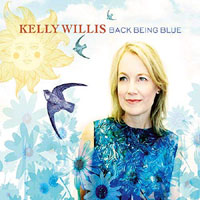 Country
singer/songwriter Kelly Willis is one of those rare artists who stubbornly insists that
being a fully committed parent and creating great art don’t have to be mutually
exclusive. Back Being Blue is Willis’s first studio album in more than ten
years, after she took time to raise her four children with husband and musical partner
Bruce Robison. If this album is any indication, Willis has managed to carve out a fertile
space for her craft. From the countrypolitan soul of the opening title track to the Fender
twang and Hammond B-3 drive of "Don’t Step Away," Back Being Blue is
set of tunes that begs to be put on repeat. Clocking in at just over 30 minutes,
the album was produced by Robison in his meticulously curated personal studio. With the
help of a solid roster of session musicians like pedal-steel player Geoff Queen and
keyboardist Trevor Nealon, this is a recording whose sonics are among the among the most
palpably present I’ve heard in any genre this year. The soundstage is immersive
without being unnaturally big. Instruments are closely miked but never come across as
unrealistically prominent. The spotlight is on the entire composition, not a
particular sound. These are characteristics all audiophile recordings should exemplify
but seldom do. After Willis's more than 25 years in the business, her vocal delivery is
delightfully effortless, whether she’s pulling off a bluegrass-tinged trill or
bending a soulful note of longing. Back Being Blue is a set of solid,
stand-the-test-of-time American songcraft. Country
singer/songwriter Kelly Willis is one of those rare artists who stubbornly insists that
being a fully committed parent and creating great art don’t have to be mutually
exclusive. Back Being Blue is Willis’s first studio album in more than ten
years, after she took time to raise her four children with husband and musical partner
Bruce Robison. If this album is any indication, Willis has managed to carve out a fertile
space for her craft. From the countrypolitan soul of the opening title track to the Fender
twang and Hammond B-3 drive of "Don’t Step Away," Back Being Blue is
set of tunes that begs to be put on repeat. Clocking in at just over 30 minutes,
the album was produced by Robison in his meticulously curated personal studio. With the
help of a solid roster of session musicians like pedal-steel player Geoff Queen and
keyboardist Trevor Nealon, this is a recording whose sonics are among the among the most
palpably present I’ve heard in any genre this year. The soundstage is immersive
without being unnaturally big. Instruments are closely miked but never come across as
unrealistically prominent. The spotlight is on the entire composition, not a
particular sound. These are characteristics all audiophile recordings should exemplify
but seldom do. After Willis's more than 25 years in the business, her vocal delivery is
delightfully effortless, whether she’s pulling off a bluegrass-tinged trill or
bending a soulful note of longing. Back Being Blue is a set of solid,
stand-the-test-of-time American songcraft.
|

 It’ll only take a few cuts of Paul
Thorn’s Don't Let the Devil Ride for you to know you’re listening to a
serious student of the Delta. Born in Tupelo, Mississippi, to a Pentecostal preacher,
Thorn comes by his roots honestly. His rough edges and lived-in voice may also have
something to do with his circuitous professional path. Thorn worked as a professional
prizefighter throughout the 1980s (ultimately facing off with Roberto Duran) before
hanging up his gloves and taking day-labor jobs and to the juke-joint stages of his
hometown. That might have been the end of Thorn’s notoriety had A&M label chief
Miles Copeland not discovered him playing in a local pizza parlor in the mid-1990s. Since
then, Thorn has honed his craft with the stubborn precision of a pugilist, each
album’s sonics getting richer, deeper and more seasoned, each one moving just a step
closer to the cradle of the blues. With Don't Let the Devil Ride, Thorn has
gathered together a collection of gospel-flavored blues and R&B classics that he
delivers with the perspiring passion of a tambourine-shaking minister. Thorn’s voice
is a combination of grit and growl that fits him like a comfortable pair of alligator
shoes. His searing rendition of Josh White’s "Jesus Gonna Make Up My Dyin’
Bed" is guaranteed to raise goose bumps. The icing on this sonic tent revival are
heartfelt contributions by The Blind Boys of Alabama, the legendary McCrary Sisters and
the Preservation Hall Jazz Band. Don't Let the Devil Ride is a roots record that
moves both body and soul.
It’ll only take a few cuts of Paul
Thorn’s Don't Let the Devil Ride for you to know you’re listening to a
serious student of the Delta. Born in Tupelo, Mississippi, to a Pentecostal preacher,
Thorn comes by his roots honestly. His rough edges and lived-in voice may also have
something to do with his circuitous professional path. Thorn worked as a professional
prizefighter throughout the 1980s (ultimately facing off with Roberto Duran) before
hanging up his gloves and taking day-labor jobs and to the juke-joint stages of his
hometown. That might have been the end of Thorn’s notoriety had A&M label chief
Miles Copeland not discovered him playing in a local pizza parlor in the mid-1990s. Since
then, Thorn has honed his craft with the stubborn precision of a pugilist, each
album’s sonics getting richer, deeper and more seasoned, each one moving just a step
closer to the cradle of the blues. With Don't Let the Devil Ride, Thorn has
gathered together a collection of gospel-flavored blues and R&B classics that he
delivers with the perspiring passion of a tambourine-shaking minister. Thorn’s voice
is a combination of grit and growl that fits him like a comfortable pair of alligator
shoes. His searing rendition of Josh White’s "Jesus Gonna Make Up My Dyin’
Bed" is guaranteed to raise goose bumps. The icing on this sonic tent revival are
heartfelt contributions by The Blind Boys of Alabama, the legendary McCrary Sisters and
the Preservation Hall Jazz Band. Don't Let the Devil Ride is a roots record that
moves both body and soul. With their third studio album, Extralife, Massachusetts-based
Darlingside continues to hone their self-described "string rock" sound to ever
more ethereal heights. While the band’s four-part-harmony-filled confections are
reminiscent of Brian Wilson’s meticulous Pet Sounds arrangements, the group
manages to throw in folkier flavors that give this set a refreshingly unique texture. On
tracks like "Singularity" Auyon Mukharji’s intricate violin and mandolin
fills weave in and out of the band’s soaring vocals, while bassist and kick drummer
Brian Senf’s driving rhythms provide just the weight needed to keep the light and
airy melody from evaporating too quickly. The pacing kicks into high gear on the galloping
"Futures," revealing an ensemble that has the instrumental chops necessary to
sustain a substantial composition. The band’s name was inspired by a famous
instruction given by British author Sir Arthur Quiller-Couch that his students should be
prepared to "kill their darlings," those precious phrases every writer fights to
defend. The rich, yet uncluttered production on Extralife would indicate that the
members are faithfully following their muse. It’s hard to find a note or phrase
that’s out of place in any of the luscious musical dishes on this organic and
balanced recording.
With their third studio album, Extralife, Massachusetts-based
Darlingside continues to hone their self-described "string rock" sound to ever
more ethereal heights. While the band’s four-part-harmony-filled confections are
reminiscent of Brian Wilson’s meticulous Pet Sounds arrangements, the group
manages to throw in folkier flavors that give this set a refreshingly unique texture. On
tracks like "Singularity" Auyon Mukharji’s intricate violin and mandolin
fills weave in and out of the band’s soaring vocals, while bassist and kick drummer
Brian Senf’s driving rhythms provide just the weight needed to keep the light and
airy melody from evaporating too quickly. The pacing kicks into high gear on the galloping
"Futures," revealing an ensemble that has the instrumental chops necessary to
sustain a substantial composition. The band’s name was inspired by a famous
instruction given by British author Sir Arthur Quiller-Couch that his students should be
prepared to "kill their darlings," those precious phrases every writer fights to
defend. The rich, yet uncluttered production on Extralife would indicate that the
members are faithfully following their muse. It’s hard to find a note or phrase
that’s out of place in any of the luscious musical dishes on this organic and
balanced recording. Singer/songwriters Kenneth Pattengale and Joey Ryan’s work
under the stage moniker The Milk Carton Kids is well known to hardcore folk fans, but
they’re less known beyond the boundaries of that particular niche. That may be partly
explained by their insistence on producing albums featuring nothing more than guitars and
voices. While dedication to that vision of simplicity produced stunning songs like
"Michigan" on their 2011 debut, I’ve always felt their albums were a bit
one-dimensional. That’s why it’s such a pleasure to hear the duo’s latest
effort, produced by the legendary Joe Henry, whose award-winning studio skills have
benefited a number of artists like Allen Toussaint and Elvis Costello. Henry has guided
Milk Carton Kids to explore wider sonic pastures without leading them away from their
trademark introspection and brutally honest commentary. In addition to his regular
wrecking crew of drummer Jay Bellerose, bassist Dennis Crouch and Levon Henry on saxophone
and B-flat clarinet, Henry directs a host of guest musicians like Wilco keyboardist Pat
Sansone. Pattengale and Ryan’s tight harmonies, which evoke a combination of Simon
& Garfunkel moodiness and Everly Brothers sweetness, are boosted by the surrounding
ensemble on standout cuts like "Younger Years." The song sounds like a sequel to
"The Boxer" without falling through the trapdoor of pastiche. The sonics on this
album can be summarized with one word: transparent.
Singer/songwriters Kenneth Pattengale and Joey Ryan’s work
under the stage moniker The Milk Carton Kids is well known to hardcore folk fans, but
they’re less known beyond the boundaries of that particular niche. That may be partly
explained by their insistence on producing albums featuring nothing more than guitars and
voices. While dedication to that vision of simplicity produced stunning songs like
"Michigan" on their 2011 debut, I’ve always felt their albums were a bit
one-dimensional. That’s why it’s such a pleasure to hear the duo’s latest
effort, produced by the legendary Joe Henry, whose award-winning studio skills have
benefited a number of artists like Allen Toussaint and Elvis Costello. Henry has guided
Milk Carton Kids to explore wider sonic pastures without leading them away from their
trademark introspection and brutally honest commentary. In addition to his regular
wrecking crew of drummer Jay Bellerose, bassist Dennis Crouch and Levon Henry on saxophone
and B-flat clarinet, Henry directs a host of guest musicians like Wilco keyboardist Pat
Sansone. Pattengale and Ryan’s tight harmonies, which evoke a combination of Simon
& Garfunkel moodiness and Everly Brothers sweetness, are boosted by the surrounding
ensemble on standout cuts like "Younger Years." The song sounds like a sequel to
"The Boxer" without falling through the trapdoor of pastiche. The sonics on this
album can be summarized with one word: transparent. Readers of this blog series will
know that I’m an avid follower of the Mali music scene in West Africa. Bamako, the
nation’s capitol, is one of the most intriguing centers of polyglot musical culture
in the world; its artists have attracted the likes of Robert Plant, Ry Cooder, Eric Bibb
and Damon Albarn. I’ve written about the Saharan Desert rock of Tuareg, bands like
Tinarawen and Imarhan, but that’s just scratching the surface of the musical
treasures Mali has to offer.
Readers of this blog series will
know that I’m an avid follower of the Mali music scene in West Africa. Bamako, the
nation’s capitol, is one of the most intriguing centers of polyglot musical culture
in the world; its artists have attracted the likes of Robert Plant, Ry Cooder, Eric Bibb
and Damon Albarn. I’ve written about the Saharan Desert rock of Tuareg, bands like
Tinarawen and Imarhan, but that’s just scratching the surface of the musical
treasures Mali has to offer. It has been 25 years since saxophonist Joshua Redman took the jazz world by
storm, garnering impossible-to-live-up-to critical hype that labeled him the new John
Coltrane. Redman, the son of saxophonist Dewey Redman, responded by keeping his head down
and shoulder to the wheel, working on dozens of records and involving himself in scores of
noteworthy side projects. Still Dreaming, Redman’s 17th album as a leader, is
proof that hard work pays off. This record is an homage to his father’s collaboration
with Ornette Coleman on the 1976 Old and New Dreams, which also featured bassist
Charlie Haden, trumpeter Don Cherry and drummer Ed Blackwell. While not the innovator
Coleman was, Redman uses his finely honed technical skills and hard-earned musical
insights on Still Dreaming to recapture that wonderful pot of free jazz, hard bop
and avant-garde instincts that Coleman stirred up back in the day. And now Redman returns
the favor by pushing the envelope a bit with the help of trumpeter Ron Miles, bassist
Scott Colley and drummer Brian Blade. Some tracks like "It’s Not the Same"
call to mind Henry Threadgill’s slightly off-kilter melodies and rhythms that teeter
close to the edge but then return to the warm comfort of familiar ground. "Blues for
Charlie" was written in honor of the late Charlie Haden, but it also manages to pay
tribute to some of the pulpit-pounding blues compositions of Charles Mingus. "Haze
and Aspirations" takes a more brooding, introspective approach and could be part of a
movie scene of a man wandering a city in search of answers. The sound of this release is
very live, and proper mic placement yields a realistic sense of studio space and
player location. It’s a what-they-played-is-what-you-get approach. With Still
Dreaming, Redman has produced an album that matches and in some ways surpasses his
father’s work with Coleman.
It has been 25 years since saxophonist Joshua Redman took the jazz world by
storm, garnering impossible-to-live-up-to critical hype that labeled him the new John
Coltrane. Redman, the son of saxophonist Dewey Redman, responded by keeping his head down
and shoulder to the wheel, working on dozens of records and involving himself in scores of
noteworthy side projects. Still Dreaming, Redman’s 17th album as a leader, is
proof that hard work pays off. This record is an homage to his father’s collaboration
with Ornette Coleman on the 1976 Old and New Dreams, which also featured bassist
Charlie Haden, trumpeter Don Cherry and drummer Ed Blackwell. While not the innovator
Coleman was, Redman uses his finely honed technical skills and hard-earned musical
insights on Still Dreaming to recapture that wonderful pot of free jazz, hard bop
and avant-garde instincts that Coleman stirred up back in the day. And now Redman returns
the favor by pushing the envelope a bit with the help of trumpeter Ron Miles, bassist
Scott Colley and drummer Brian Blade. Some tracks like "It’s Not the Same"
call to mind Henry Threadgill’s slightly off-kilter melodies and rhythms that teeter
close to the edge but then return to the warm comfort of familiar ground. "Blues for
Charlie" was written in honor of the late Charlie Haden, but it also manages to pay
tribute to some of the pulpit-pounding blues compositions of Charles Mingus. "Haze
and Aspirations" takes a more brooding, introspective approach and could be part of a
movie scene of a man wandering a city in search of answers. The sound of this release is
very live, and proper mic placement yields a realistic sense of studio space and
player location. It’s a what-they-played-is-what-you-get approach. With Still
Dreaming, Redman has produced an album that matches and in some ways surpasses his
father’s work with Coleman. From the spooky, resonant cello lines and luscious string arrangements of the
opening track on Lera Lynn’s third studio album, you know this is not going to be a
paint-by-the-numbers Americana record. Produced by Civil Wars co-founder John Paul White, Plays
Well With Others is a tightly arranged set of duets featuring a wide variety of
performers whose songwriting matches their considerable vocal talents. Performers like
Rodney Crowell, Peter Bradley Adams and Andrew Combs certainly know their way around a
memorable melody and lyric. Lynn’s voice is more than up to the adaptive demands,
going from the laconic depths reminiscent of Mazzy Star’s Hope Sandoval on "In
Another Life" all the way up to the yearning Sheryl Crowe-style high notes of
"Nothing to Do With Your Love." John Paul White’s production wisely avoids
the moody murkiness of Lynn’s appearances on the second-season soundtrack of
HBO’s True Detective, giving the sessions just the right amount of refreshing
verve and snap. White and Lynn’s final duet "Almost Persuaded" is a
wonderful combination of George and Tammy lamentation and gospel bluegrass simplicity.
This is the kind of collaboration that makes you wish for a volume two.
From the spooky, resonant cello lines and luscious string arrangements of the
opening track on Lera Lynn’s third studio album, you know this is not going to be a
paint-by-the-numbers Americana record. Produced by Civil Wars co-founder John Paul White, Plays
Well With Others is a tightly arranged set of duets featuring a wide variety of
performers whose songwriting matches their considerable vocal talents. Performers like
Rodney Crowell, Peter Bradley Adams and Andrew Combs certainly know their way around a
memorable melody and lyric. Lynn’s voice is more than up to the adaptive demands,
going from the laconic depths reminiscent of Mazzy Star’s Hope Sandoval on "In
Another Life" all the way up to the yearning Sheryl Crowe-style high notes of
"Nothing to Do With Your Love." John Paul White’s production wisely avoids
the moody murkiness of Lynn’s appearances on the second-season soundtrack of
HBO’s True Detective, giving the sessions just the right amount of refreshing
verve and snap. White and Lynn’s final duet "Almost Persuaded" is a
wonderful combination of George and Tammy lamentation and gospel bluegrass simplicity.
This is the kind of collaboration that makes you wish for a volume two. Country
singer/songwriter Kelly Willis is one of those rare artists who stubbornly insists that
being a fully committed parent and creating great art don’t have to be mutually
exclusive. Back Being Blue is Willis’s first studio album in more than ten
years, after she took time to raise her four children with husband and musical partner
Bruce Robison. If this album is any indication, Willis has managed to carve out a fertile
space for her craft. From the countrypolitan soul of the opening title track to the Fender
twang and Hammond B-3 drive of "Don’t Step Away," Back Being Blue is
set of tunes that begs to be put on repeat. Clocking in at just over 30 minutes,
the album was produced by Robison in his meticulously curated personal studio. With the
help of a solid roster of session musicians like pedal-steel player Geoff Queen and
keyboardist Trevor Nealon, this is a recording whose sonics are among the among the most
palpably present I’ve heard in any genre this year. The soundstage is immersive
without being unnaturally big. Instruments are closely miked but never come across as
unrealistically prominent. The spotlight is on the entire composition, not a
particular sound. These are characteristics all audiophile recordings should exemplify
but seldom do. After Willis's more than 25 years in the business, her vocal delivery is
delightfully effortless, whether she’s pulling off a bluegrass-tinged trill or
bending a soulful note of longing. Back Being Blue is a set of solid,
stand-the-test-of-time American songcraft.
Country
singer/songwriter Kelly Willis is one of those rare artists who stubbornly insists that
being a fully committed parent and creating great art don’t have to be mutually
exclusive. Back Being Blue is Willis’s first studio album in more than ten
years, after she took time to raise her four children with husband and musical partner
Bruce Robison. If this album is any indication, Willis has managed to carve out a fertile
space for her craft. From the countrypolitan soul of the opening title track to the Fender
twang and Hammond B-3 drive of "Don’t Step Away," Back Being Blue is
set of tunes that begs to be put on repeat. Clocking in at just over 30 minutes,
the album was produced by Robison in his meticulously curated personal studio. With the
help of a solid roster of session musicians like pedal-steel player Geoff Queen and
keyboardist Trevor Nealon, this is a recording whose sonics are among the among the most
palpably present I’ve heard in any genre this year. The soundstage is immersive
without being unnaturally big. Instruments are closely miked but never come across as
unrealistically prominent. The spotlight is on the entire composition, not a
particular sound. These are characteristics all audiophile recordings should exemplify
but seldom do. After Willis's more than 25 years in the business, her vocal delivery is
delightfully effortless, whether she’s pulling off a bluegrass-tinged trill or
bending a soulful note of longing. Back Being Blue is a set of solid,
stand-the-test-of-time American songcraft.